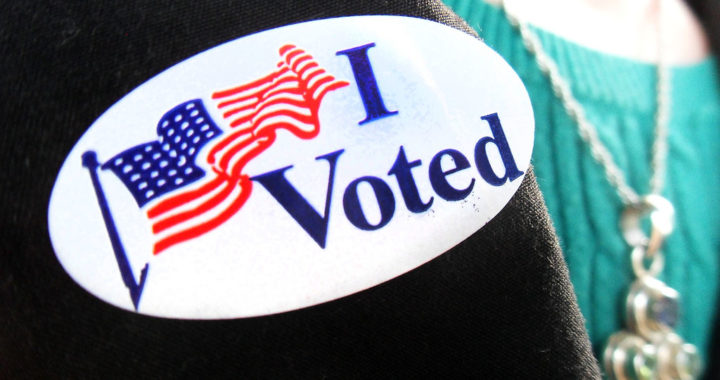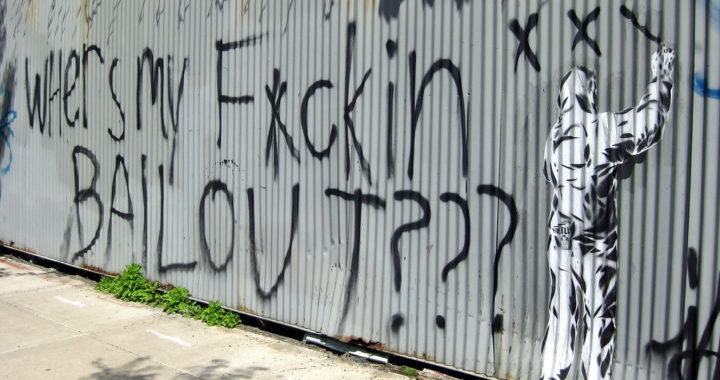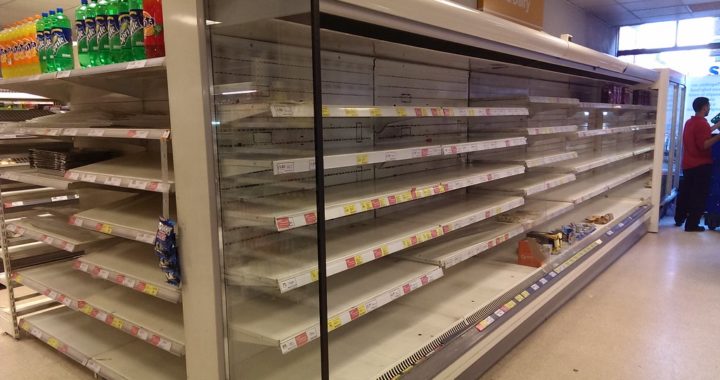‘A Day That Will Live in Infamy’: This Is What It Looked Like When Wisconsin Forced In-Person Voting During a Pandemic
“People are being forced to risk their lives to place their vote or fulfill their right as an American to vote.”
by Jessica Corbett
As footage of Wisconsin’s crowded polling stations flooded the internet Tuesday, public health officials and civil rights advocates condemned the state’s Supreme Court and Republican legislative leaders for allowing in-person voting during the coronavirus pandemic and thwarting Democratic Gov. Tony Evers’ last-minute efforts to address voter safety concerns.
“These are dangerous times for democracy.”
—Aquene Freechild, Public Citizen“It’s not going to be a safe election. People are going to get sick from this,” Brook Soltvedt, a 60-year-old textbook editor who is in charge of running the polling place at Thoreau Elementary School in Madison, Wisconsin’s capital, told The Cap Times.
Soltvedt added that though she thinks “the city has done about the best that they can do,” she worries that the election will cause voter confusion and health consequences. In an effort to protect her 77-year-old husband, Soltvedt said she plans to “strip in the garage, put my clothes in the washer, and go downstairs for two weeks.”
Voting lines in Milwaukee: One hour and 40 minutes#fightfor15 pic.twitter.com/v8szjGLnlL
— Fight For 15 (@fightfor15) April 7, 2020
After days of Wisconsin’s Republican Assembly Speaker Robin Vos and Senate Majority Leader Scott Fitzgerald resisting widespread demands to delay in-person voting and expand absentee voting—like other states have done—Evers on Monday issued an executive order to postpone the election until June 9. However, the order was overturned by the state Surpreme Court Monday night.
The right-wing U.S. Supreme Court added insult to injury on Monday, overturning a lower court ruling that extended the deadline for absentee voting. Absentee ballots must be postmarked Tuesday or returned to a polling place or local clerk’s office by 8 pm. Local leaders have expressed worries that due to a backlog of requests, residents may not receive absentee ballots in time to vote.
“What that meant was that, for a substantial portion of the electorate, Election Day presented a harsh choice,” John Nichols wrote Tuesday in a column for the Cap Times. “Those who had applied for absentee ballots but not yet received them, and those who had not applied for an absentee ballot by last Friday’s deadline, were forced to decide whether to risk exposure to the coronavirus in order to exercise their right to vote.”
Nichols denounced the dilemma faced by voters as “unreasonable” and characterized Vos and Fitzgerald as “legislative charlatans” who “threw tantrums at a point when everyone else was working to save lives, keep people healthy, stabilize the economy, and preserve democracy.”
“Tony Evers did his part,” wrote Nichols. “Vos, Fitzgerald, and the [state] Supreme Court majority failed us.”
Other concerned individuals and advocacy organizations issued similarly scathing critiques of Wisconsin’s lawmakers and high court while circulating on social media footage of longs lines at the limited polling stations that were able to open.
Polls are open in Wisconsin.
With a global pandemic, this election should be delayed.
Republicans in the state legislature & SCOTUS have ensured that thousands of ballots won’t even count.
In 24 hrs, they’ve threatened the health of our nation & democracy.
Stay safe Wisconsin
— Rep. Mark Pocan (@repmarkpocan) April 7, 2020
This is beyond irresponsible https://t.co/HH7tgNgisD
— Eddie S. Glaude Jr. (@esglaude) April 7, 2020
“Today there are five Milwaukee polling locations open. Usually there are 180 sites,” tweeted the group March for Our Lives. “There’s no way to skirt around it; this is wrong. People are forced to gather in long lines at central locations in the midst of a pandemic. Wisconsinites deserve better.”
Aquene Freechild, co-director of Public Citizen’s Democracy Is For People Campaign, said in a statement about the Wisconsin election that “these are dangerous times for democracy.”
“Vos and Fitzgerald know that, with only five polling locations open in the Democratic stronghold of Milwaukee, holding the election now will suppress the Democratic vote more than the GOP vote,” Freechild added. “That outcome will skew votes for some statewide elections, such as for the state Supreme Court, to their party.”
In a statement Tuesday, Harvard Law School professor and Equal Citizens founder Lawrence Lessig said, “That partisan politics would drive partisan leaders to force citizens to choose between accelerating a pandemic and exercising their right to vote is outrageous.”
What used to be almost 200 polling locations in Milwaukee, has been cut down to 5. At this location alone the wait is an hour and 40 min.
There is no way to justify the #WisconsinPrimary. But Republicans don't care about justifying it, just that they'll get to maintain power. https://t.co/Qppr9THObG
— Sunrise Movement ? (@sunrisemvmt) April 7, 2020
Teasing an episode of the Intercepted podcast to be released Wednesday, journalist Jeremy Scahill—who grew up in Wisconsin—tweeted an audio clip of Milwaukee Health Commissioner Dr. Jeannette Kowalik explaining that “unfortunately it’s not” safe to tell voters to go to the polls.
“People are being forced to risk their lives to place their vote or fulfill their right as an American to vote. It’s just unbelievable that we are even having this conversation right now,” Kowalik said. She added that it has been “disheartening” to work behind-the-scenes on this issue and some people in positions of power in Wisconsin “are killing people by the decisions that they’re making.”
Service Employees International Union (SEIU) president Mary Kay Henry tweeted a video from a Milwaukee polling site and wrote that “this is a deliberate attempt by WI GOP to exclude voters, to limit participation, [and] to undermine democracy.”
In a lengthy Twitter thread, AFL-CIO president Richard Trumka, declared that “it’s unconscionable that Wisconsin voters are being forced to choose between their health amid a pandemic and their constitutional right to vote.”
“It’s unconscionable that Wisconsin voters are being forced to choose between their health amid a pandemic and their constitutional right to vote.”
—Richard Trumka, AFL-CIO“Taking away the fundamental right to vote that so many have fought and died for is disgraceful. Democracy in our country is dying, and those meant to uphold our Constitution have failed miserably in their duty,” Trumka added. “Working people see what’s happening, and we’re not going to stand for it in November and beyond.”
Common Cause Wisconsin called Tuesday “a day that will live in infamy.” The group’s director, Jay Heck, said in a statement that “Wisconsin is the only state in the nation that has failed to step up and respond responsibly and safely to the current national health pandemic emergency. We have seven months until the general election and there is time to fix these issues before November to ensure we are protecting public health and the right to vote.”
Voters who participated in Wisconsin’s Tuesday election weighed in on local races as well as the Democratic presidential primary contest between Sen. Bernie Sanders (I-Vt.)—who spoke out against the state Supreme Court decision—and former Vice President Joe Biden, who remains the frontrunner and recently claimed that in-person voting could be done safely.
Election officials across Wisconsin took various steps to protect voters. Palmyra Clerk/Treasurer Laurie Mueller told the Milwaukee Journal Sentinel that the village’s sole polling place was moved to a bigger location.
According to the newspaper:
Mueller said a volunteer at the door is spray-sanitizing everyone’s hands as they enter, and voters are being instructed to take a pen to vote and then either throw it away or take it home with them.
Poll workers outfitted with masks and gloves are working behind sneeze guards made by the village’s public works employees. There are Xes on the floor at 6-foot intervals.
“We have a person wiping down the poll booths after everyone votes,” Mueller said, “and then randomly wiping down other areas in the voting location.”
licensed under a Creative Commons Attribution-Share Alike 3.0 License.
‘This Is Unacceptable’: Trump Administration Says Millions May Have to Wait 5 Months to Receive $1,200 Relief Check
‘This Is Unacceptable’: Trump Administration Says Millions May Have to Wait 5 Months to Receive $1,200 Relief Check
“That’s not even remotely fast enough for the millions of working people who have seen their hours slashed, their expenses rise, and their government refuse to take sufficient action.”
By Jake Johnson
More than 10 million Americans lost their jobs last month and are in desperate need of immediate financial assistance amid the coronavirus crisis, but the Trump administration said in a draft plan circulated internally Thursday that people who do not have direct deposit information on file with the IRS—a group that is disproportionately low-income—may have to wait until September to receive the one-time $1,200 payment authorized under the latest stimulus.
The IRS said in the draft plan that it intends to start sending electronic payments by late next week to those with direct deposit information on file from their 2018 or 2019 tax returns, the Washington Post reported.
“As people lose their jobs, we can’t leave them in the cold while big corporations easily access their bailout money.”
—Rep. Alexandria Ocasio-Cortez“However, $30 million in paper checks for millions of other Americans won’t start being sent out until April 24, as the government lacks their banking information,” according to the Post. “And some of those checks won’t reach people until September, the document shows, underscoring the reality that many Americans could have to wait five months to receive their checks.”
During a press briefing Thursday evening, Treasury Secretary Steve Mnuchin—who just last week dismissed surging unemployment as “not relevant”—promised that Americans without direct deposit information on file will soon be able to access a “web portal” to provide their banking details to the IRS.
Patricia McLaughlin, a Treasury Department spokesperson, told the Post that “the overwhelming majority of eligible Americans” will receive stimulus payments within the next three weeks, but progressive lawmakers and advocates are warning that millions of vulnerable people—including those living on Supplemental Security Income (SSI) and veteran pensions—could fall through the cracks.
“This is unacceptable,” Rep. Alexandria Ocasio-Cortez said of the possible five-month delay in an email to supporters late Thursday. “That not even remotely fast enough for the millions of working people who have seen their hours slashed, their expenses rise, and their government refuse to take sufficient action.”
“This lockdown could last for months,” said Ocasio-Cortez. “As people lose their jobs, we can’t leave them in the cold while big corporations easily access their bailout money.”
Others similarly raised alarm about the IRS’ estimated timeline, which experts warn could be derailed by technical glitches.
“This is such a stupid disaster. We did not have to have mass unemployment,” tweeted New York Times columnist Farhad Manjoo. “The policy response could have been to have the government pay companies’ payroll, like European countries are doing. Instead we’re letting people lose their jobs and sending them too-small checks too late.”
people are gonna get evicted waiting for these checks
people are going to die waiting for these checks https://t.co/Li8jR9ECZz
— Kelsey D. Atherton (@AthertonKD) April 2, 2020
The Washington Post reported that the IRS draft plan “would distribute paper checks to the lowest-income Americans first, prioritizing payments for individual taxpayers with incomes of $10,000 or less on April 24.”
“Checks for earners of $20,000 or less would be in the mail May 1, followed by those with incomes of $30,000 on May 8, $40,000 on May 15, and continuing in income increments of $10,000 each week,” according to the Post. “The IRS plans to issue about 5 million checks each week.”
Late Wednesday, the Trump administration reversed policy guidance that would have required millions of Social Security recipients to file a tax return in order to receive their payments. However, critics said the reversal needlessly leaves out many SSI recipients and veterans, potentially causing massive delays in payments.
“The president appears more interested in putting his name on the check than getting it to Americans as quickly as possible.”
—Aaron Klein, Brookings Institution“These are important members of our communities living with additional burdens in this pandemic,” Chuck Marr, senior director of federal tax policy at the Center on Budget and Policy Priorities, wrote in a blog post Thursday. “There’s no reason to add to that burden by making them navigate filing a tax return when their government has all it needs to deposit a rebate in their bank account.”
As millions of people worry about payment delays, many others—including high school seniors, college students, and immigrant families—have learned in recent days that they are not eligible for the one-time $1,200 payments, which are part of a massive stimulus package President Donald Trump signed into law last Friday.
Aaron Klein, a fellow in economics studies at the Brookings Institution, estimated Tuesday that around 70 million Americans “are likely to have to wait at least another month, or more,” to receive their stimulus payment because they didn’t owe taxes—and thus did not file a return—in 2018 or 2019, or they did not use direct deposit for their tax refund.
“Despite being the largest economy on earth we lack both government run real-time payments and universal bank accounts, systems common among developed countries,” Klein noted. “Americans shouldn’t have to wait for Congress to act. Federal bank regulators have substantial authority to fix these problems. The Federal Reserve could require all checks under $5,000 to be immediately available to consumers, a power Congress delegated in the 1980s.”
“Ultimately, where there is a will, there is a way,” Klein wrote. “The president appears more interested in putting his name on the check than getting it to Americans as quickly as possible. The response to COVID is exposing a lot of problems ignored for too long. Add our basic banking and payment systems to this growing list.”
Our work is licensed under a Creative Commons Attribution-Share Alike 3.0 License.
‘Government Needs to Step In’: Food Banks Across US Report Unprecedented Demand—and Shortages—as Coronavirus Pandemic Ravages
‘Government Needs to Step In’: Food Banks Across US Report Unprecedented Demand—and Shortages—as Coronavirus Pandemic Ravages
“We’re seeing people from every socio-economic level because the majority of Americans live paycheck to paycheck.”
By Julia Conley
As 6.6 million Americans filed jobless claims last week—part of at least 10 million people in the U.S. who are out of work in the last two weeks due to the coronavirus pandemic—increasingly long lines at food banks across the country offered another grim illustration of the financial realities faced by the poor and working classes in the United States.
According to an investigation by The Guardian, demand at food banks has increased by eight times in some areas. About a third of people interviewed by the outlet at food banks last month had never before needed food assistance.
Kristin Warzocha, CEO of the Greater Cleveland Food Bank, said the trend was not surprising considering the precarious circumstances working Americans are accustomed to living in, with 78% of workers living paycheck to paycheck and 45% reporting that they have no savings account.
“We’re seeing people from every socio-economic level because the majority of Americans live paycheck to paycheck,” Warzocha told The Guardian.
The coronavirus, officially known as COVID-19, spread to every state in the U.S. in March and drove governments in 38 states to direct nearly 300 million people to stay home—forcing businesses across the country to close and lay off or furlough workers.
In Cleveland, The Guardian spoke with first-time food bank visitors including a freelance photographer, a woman who worked in the hospitality industry, and a cab driver.
At St. Mary’s Food Bank in Phoenix, Arizona, spokesman Jerry Brown reported that “people who knew about us because they donated or volunteered are coming in for food.”
“The 2008 recession doesn’t touch this,” Brown told The Guardian. “It’s a different ballgame.”
On social media, a number of media outlets detailed unprecedented demand and supply shortages at food banks in Florida, Arizona, and Pennsylvania—where Pittsburgh Post-Gazette photographer Andrew Rush posted an aerial view of hundreds of cars lined up outside the Greater Community Food Bank in Duquesne.
Hundreds of cars wait to receive food from the Greater Community Food Bank in Duquesne. Collection begins at noon. @PghFoodBank @PittsburghPG pic.twitter.com/94YFaO7dqX
— Andrew Rush (@andrewrush) March 30, 2020
CORONAVIRUS:
The Arizona National Guard stepped up its efforts to bolster the supply of food Thursday, as a few dozen soldiers packed boxes at food banks seeing a surge in demand. The U.S. so far has reported 93,427 COVID-19 cases, and 1,385 deaths.
(AP) pic.twitter.com/suEupAoha4
— The Voice of America (@VOANews) March 27, 2020
Produce is rotting on the vine in South Florida, but the demand at food banks is higher than ever. At a recent food giveaway in Miami, the line of cars was eight miles long. Incredible story by @Carlos_Frias & @KevinGHall https://t.co/r0rpT1wkK1
— Alex Harris (@harrisalexc) March 31, 2020
The food bank in Greater Pittsburgh reported it received more than 1,000 calls from people in need of assistance in the past two weeks. Ninety percent of the calls were from people who were newly unemployed.
In Massachusetts, a pantry in Amherst distributed 849% more food in March than it did last year.
The high demand at the nation’s food banks comes as some Americans await a means-tested one-time payment of $1,200 per adult—a figure that is projected to last the average household less than two weeks in the midst of a crisis that could go on for several months.
In order to support the rising number of Americans facing job loss and food-insecurity, Kellie O’Connell of the Lakeview pantry in Chicago told The Guardian, the federal government must take responsibility for ensuring working people in the wealthiest country in the world don’t go hungry.
“Philanthropy and not-for-profits are not going to be able to meet food demands,” O’Connell said. “The government needs to step in.”
licensed under a Creative Commons Attribution-Share Alike 3.0 License.



